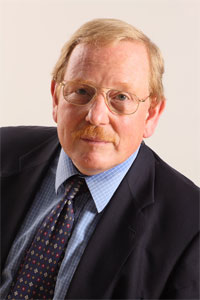2010 Jansky Lecturer: Prof. Reinhard Genzel
 The National Radio Astronomy Observatory is pleased to announce that the 2010 Karl G. Jansky Lectureship has been awarded to Prof. Reinhard Genzel, Director of the Max Planck Institute for Extraterrestrial Physics and Full Professor at the University of California, Berkeley. The Jansky Lectureship is an honor established by the Trustees of Associated Universities, Inc., to recognize outstanding contributions to the advancement of radio astronomy.
The National Radio Astronomy Observatory is pleased to announce that the 2010 Karl G. Jansky Lectureship has been awarded to Prof. Reinhard Genzel, Director of the Max Planck Institute for Extraterrestrial Physics and Full Professor at the University of California, Berkeley. The Jansky Lectureship is an honor established by the Trustees of Associated Universities, Inc., to recognize outstanding contributions to the advancement of radio astronomy.
Prof. Genzel will present a Jansky Public Lecture and a Jansky Scientific Lecture in Charlottesville, Virginia and Socorro, New Mexico.
The Jansky Public Lecture -- "The Galactic Center Black Hole and Nuclear Star Cluster"-- will be held in Charlottesville on Monday, November 1, 2010 at 7:00 p.m. in the Auditorium of the Harrison Institute. Parking will be validated for the Central Grounds Parking Garage. The Jansky Public Lecture in Socorro will begin at 8:00 p.m. on Friday, November 5, 2010, at the Workman Center in Room 101.
The Jansky Scientific Lecture -- "The Formation and Evolution of Massive Proto-disk Galaxies" will describe recent discoveries regarding how massive, gas rich disks formed via accretion from the intergalactic web ~ 10 Gyrs ago. The scientific lecture in Charlottesville will take place on Tuesday, November 2, at 4:00 p.m. in the NRAO auditorium at 520 Edgemont Road, on the UVa grounds. Prof. Genzel will also present this Lecture at the NRAO Science Operations Center (SOC) auditorium during the New Mexico Symposium (please register by October 27). The SOC is on the New Mexico Institute of Mining and Technology campus in Socorro.
Prof. Genzel received his PhD from the University of Bonn in 1978, where he wrote his thesis on water masers in star forming regions, and then went to the Harvard-Smithsonian Center for Astrophysics where he developed statistical parallax methods to determine the distance to water maser sources. In 1980 he went to UC, Berkeley, as a Miller Fellow and in 1981 joined the Physics Department faculty. He left Berkeley in 1986 to become Director at the Max-Plank Institute for Extraterrestrial Physics, although in 1999 he returned to Berkeley as a Professor on a part-time basis.
Prof. Genzel's work has been recognized with many honors and awards, including the Newton Lacy Pierce Prize (1986), the Gottfried Wilhelm Leibniz Prize (1990), the De Vaucouleurs Medal (2000), the Janssen Prize (2000), the Stern Gerlach Medal for experimental physics (2003), the Balzan Prize for infrared astronomy (2007), the Shaw Prize (2008), and the "Galileo 2000" Prize (2009). He became a foreign member of the United States National Academy of Sciences in 2000.
Prof. Genzel's professional interests lie in experimental astrophysics. He and his collaborators have developed instrumentation at sub-millimeter and infrared wavelengths to probe the central regions of galaxies, including the Milky Way, in order to test the paradigm that active galactic nuclei contain massive black holes. Prof. Genzel and collaborators were able to show from near-infrared imaging observations of the motions of stars within the central few light-days of the Milky Way that there must be a central black hole containing ~106 solar masses. More generally, Prof. Genzel is interested in understanding whether accretion onto massive black holes or star formation powers active galaxies.
Prof. Genzel continues to develop instrumentation and techniques in adaptive optics and interferometry to push the frontiers of high-resolution imaging and spectroscopic observations of galaxies using such diverse facilities as SOFIA, Herschel, the VLT, and the Keck telescopes.
We are pleased to have a scientist of Prof. Genzel's stature for the 2010 Jansky Lectureship, and we look forward to his visit and presentation this fall.
Fred K.Y. Lo
NRAO Director




Connect with NRAO